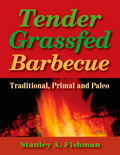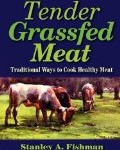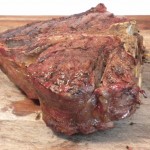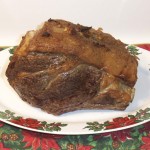A Magnificent Roast — Grassfed and Fatty
By Stanley A. Fishman, author of Tender Grassfed Meat and Tender Grassfed Barbecue
Our ancestors prized the fat in meat. Humans have raised beef cattle on grass for thousands of years, and they always tried to raise them to be fatter. Incredible breeds were developed over the centuries, cattle that fattened well on good grass and provided tender, delicious, meat; full of the nutritional benefits of grassfed fat. This beef was prized and loved.
Then two events happened that denied most of us access to this wonderful meat.
The first, starting mainly after World War II, was the widespread adoption of fattening cattle on grain, starting out with corn grown by artificial fertilizer, then leading to the use of soybeans and other substances, and resulting in a system where most cattle were taken from the pasture and sent to a feedlot to be fattened with foods that were never part of their natural diet. This resulted in a change of the very composition of the fat of the animals, and a great decline in taste.
The second was the false belief, almost universally held to be true, that eating animal fat increased cholesterol levels in the blood, causing heart disease. We now know, from extensive research, that this was never true. But this false belief led to the demonization of all animal fat. Meat was routinely trimmed of all visible fat, and leaner meats were widely claimed to be healthier.
When I started eating grassfed beef, and learned how to cook it, I was amazed at how good it tasted, and how much better I felt after eating it. Yet I immediately ran into the problem that grassfed meat providers trimmed most if not all of the fat off the meat, and most tried to make a selling point of how lean their meat was.
This began a constant struggle to try to get grassfed meat with more fat in it, and more fat on it, a struggle that continues to this day. Throughout this period, I had one solid, superb meat supplier, and I was able to get fattier grassfed meat from them, and it was wonderful. Yet I was unable to get an old style grassfed roast, with a thick cap of its own glorious fat, and ample marbling. Until recently.
Note the beauty of the raw prime rib roast in the photo above. That is a magnificent piece of grassfed meat. The tiny steaks of white fat in the meat are called marbling, and the flavor and tenderness they provide to a roast when they melt into the meat has to be tasted to be understood. The thick cap of natural fat covering the roast is known as the fat cap, and it melts over and into the meat as it cooks, basting it, and making it even more tender and delicious, and preventing the meat from drying out.
This is a roast that our ancestors would have appreciated, the kind that was recommended and celebrated in older cookbooks.
The photo at the top of the page shows the same roast, after it was cooked, just prior to being carved and enjoyed. The photo shows the beauty of the roast, but it cannot recreate the wonderful aroma, the tenderness of the absolutely delicious meat, the feeling of joy and satisfaction as it was tasted. It felt so right, so familiar, somehow. The roast was marinated with a combination of four traditional ingredients, all of which helped bring out its superb natural flavor, and slow roasted on a pellet barbecue using oak as the wood. Very easy, very simple, utterly tender and delicious.
I recommend cooking a roast this fatty, medium rare (to around 130 degrees), rather than rare. This allows the fat to melt into the meat, which gives it that characteristic prime rib flavor and tenderness.
The success and popularity of the Ketogenic movement, which appreciates the value of good fat, is making fatty grassfed meat more popular.
One of the secrets of great cooking is to get great ingredients. This roast was obtained from my favorite meat supplier, U.S. Wellness Meats. If you want to try it, here is the link. Be sure to ask for a “high fat prime rib” in the Note section of your order.
I will not receive any compensation if you order this roast.
I am disclosing once again that I have a long and excellent relationship with U.S. Wellness Meats, going back eleven years. They were the first provider to sell me grassfed meat that I could make tender, and I have ordered regularly from them ever since. The founder of U.S. Wellness, John Wood, encouraged me to write my first grassfed cookbook, and bought a number of copies when it first came out, and sold and helped publicize the book. I am proud to call him my friend, and I have other friendships with some great people in the organization. They still sell both of my books, which they purchase from me.
That said, our relationship would never have been close if they had not provided me with so much excellent meat, over so many years. And the photos speak for themselves.


 Photos of recipes from the new book Tender Grassfed Barbecue
Photos of recipes from the new book Tender Grassfed Barbecue
 Photos of recipes from the cookbook Tender Grassfed Meat
Photos of recipes from the cookbook Tender Grassfed Meat

